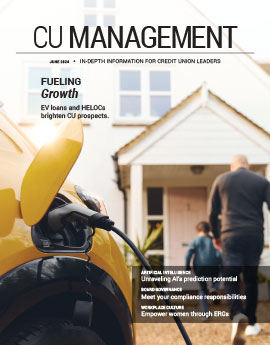3 minutes
Make sure your board surfaces assumptions as a regular part of its work on strategy.
 Taxi companies have taken a big hit as Uber, the much-discussed private, on-demand ride service, has come to the fore. But notably, Uber has been around almost a decade, and only became big in the last couple of years.
Taxi companies have taken a big hit as Uber, the much-discussed private, on-demand ride service, has come to the fore. But notably, Uber has been around almost a decade, and only became big in the last couple of years.
This is common, according to Peter Sheahan, founder and CEO of Karrikins Group (formerly Change Labs), Auckland, New Zealand, who presented at CUES’ Directors Conference in Orlando on Monday.
“Nothing ever changes in industry that didn’t exist on the periphery for a time,” Sheahan said. “Change is actually really slow until it’s not.
It’s like these new technologies nip away, nip away, nip away, and then overnight gain massive momentum.
“Just ask the taxi drivers,” he explained. “Uber turned 10 recently. It sat on the periphery for eight years, but now it grows 10 times every month.”
Sheahan encouraged the directors in attendance to learn how to differentiate good decision-making from bad decision-making in the face of inevitable market disruption. The key, he said, is the quality of assumptions that leaders make.
“Understand your role as a questioner of legacy beliefs and assumptions when you help to appropriate, set, approve and then govern the strategy of the organization,” Sheahan told attendees.”
It doesn’t matter how well you execute the wrong strategy. Getting strategy right is as important as getting execution right. Assumptions you make will long into the futures of the credit unions and the communities that you serve.”
Is it possible to possible to respond to change and do more damage to your organization’s value by not being particularly strategic, Sheahan asserted. A key way to help your board respond well is by having a specific “assumptions identification” part of your strategy-building process.
Sheahan offered these “assumptions worthy of exploration” by credit union leaders:
- We can win by not being a bank.
- We only compete with banks.
- Our value proposition can remain unchanged.
- We deliver a superior level of member/customer intimacy.
- We know our members better than banks know their customers.
- We will be able to maintain our independence.
- Our members won’t demand the same level of technology innovation.
- Wealth management/advice is a secondary offer.
Sheahan explained what can happen when organizations don’t question their assumptions by telling a story about a client organization that was in the business of U.S. national security. The organization’s CEO held a “Ted-talk”-like event for which one of the speakers “had on skinny jeans and sneakers. He looked about 11,” Sheahan said.
This speaker told the group of assembled experts, including two people who had served on the joint chiefs of staff (a key group of Presidential military advisors): “I believe that social media in early 2010 will have far-reaching geopolitical and national security impacts in the next decade.”
One of the experts in the audience said, “You mean things like Twitface and stuff?” The speaker responded, seeming almost offended by the question: “You mean like Twitter and Facebook? Yes.”
Despite the fact that this speaker had a Ph.D. from MIT, the audience members laughed at him. “That’s ridiculous,” they responded. Yet the presentation was made nine months to the day before the Arab Spring—a wave of demonstrations, protests, riots and civil wars in the Arab world that was fueled by social media.
Three of the executives in the audience thought the presenter was onto something and they promoted the idea of the organization getting into software for security, but the hardware-focused old guard shot them down, Sheahan said.
Summarizing his point, Sheahan said that boards should be able to explain their assumptions to clarify they’re on the right path.
“To believe this is the right strategy, [be able to say] ‘here are the assumptions we made about technology, scale, and regulations,’” Sheahan added. “It would scare you how many boards don’t engage in this in a rigorous fashion.”
Lisa Hochgraf is a CUES senior editor.








